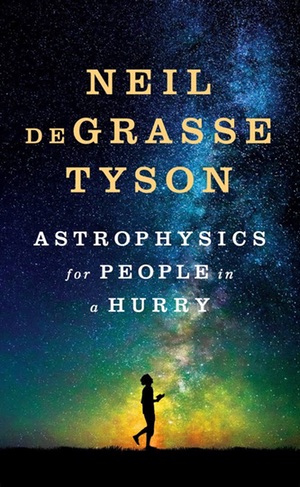Review: Astrophysics for People in a Hurryby Jeff Foust
|
| “During our brief stay on planet Earth, we owe ourselves and our descendants the opportunity to explore,” he writes, in part because it’s fun, but also because it’s critical to our future. |
Tyson can also be a little polarizing, though, and not just to people who might be hostile to his scientific worldview. Earlier this month, in an effort to show solidarity with the people of Houston after Hurricane Harvey, he tweeted that the “first word of the first comment spoken from the Moon was Houston: ‘Houston, Tranquility base here, the Eagle has landed.’” When one person pointed out that Apollo 11 crew said a number of things from the lunar surface before that phrase, starting with “contact light,” Tyson countered that they were “a short series of statements related to the state of the vessel. I don’t think of them as ‘comments.’” Okay, then.
Tyson’s latest book, Astrophysics for People in a Hurry, came out earlier this year. Would the Tyson that appeared on its pages be the one that offered a graceful, elegant view of the cosmos, or the snarky, sometimes even combative one that appears on social media? Maybe it didn’t matter. The book was an instant success, climbing to the top of the bestseller lists: it has spent 20 weeks on the New York Times’ list of nonfiction hardcovers, most recently at number three behind new books on the 2016 campaign by Hillary Clinton and NBC reporter Katy Tur. The publishers, in fact, never bothered to send a review copy, despite a request for one.
But, with a long series of flights ahead to travel to Australia for a conference, I bought the book to help pass the time. Rest assured that the Tyson that appears in this book is mostly the thoughtful, imaginative science communicator—although a little snark does sneak in.
The concept behind the book, as the title suggests, is to provide insights into the universe in small chunks, small enough to be read in the few minutes of free time that people in hurry might only have available. A dozen chapters cover a range of astrophysics topics, from the Big Bang, dark matter, and dark energy, to the solar system and the search for exoplanets. Each is concise, although not necessarily a quick read: the first chapter on the Big Bang, for example, dives into quarks, bosons, and the Planck era within its first few pages, which might be a little bewildering for the reader in too much of a hurry.
Elsewhere, though, he quickly and clearly takes on key issues. When comparing skepticism about dark matter with the discredited “aether” proposed in the 19th century, he argues that the ignorance now over what dark matter is “differs fundamentally” from the ignorance then about aether. “We’re not inventing dark matter out of thin space; instead, we deduce its existence from observational facts,” he writes. “The worst that can happen is we discover dark matter does not consist of matter at all, but of something else.”
Tyson, though, keeps a little bit of attitude in the book. In a chapter about interplanetary space, he refers to a volume “large enough to contain the orbit of Neptune, the outermost planet” followed by a footnote: “No, it’s not Pluto. Get over it.” That is, thankfully, the only reference to the debate over Pluto’s planetary status that helped make Tyson famous—and infamous—years ago.
| Prhaps the battle for the scientific hearts and minds is as pitched as ever, with the sales of his book a sign not that the scientific worldview Tyson espouses in winning, but rather of the intensity of the fight. |
In the book’s final chapter, Tyson works to put this interest in astrophysics into a broader picture: why should we care about the origin and composition of the universe when there are so many other problems to address, and when humanity is so insignificant at the scale of the universe. “During our brief stay on planet Earth, we owe ourselves and our descendants the opportunity to explore,” he writes, in part because it’s fun, but also because it’s critical to our future. “The day our knowledge of the cosmos ceases to expand, we risk regressing to the childish view that the universe figuratively and literally revolves around us.”
In the book’s preface, though, he almost suggests that’s not something to worry about. Noting what he says to be increased coverage of science in the media, he claims “this rise in coverage likely comes from a genuine increase in the public’s appetite for science.” If that’s the case, there would seem to be little risk of “regressing to the childish view” that Tyson fears in the book’s final pages.
The book’ impressive sales would seem to support Tyson’s view that there is a “genuine increase” in interest about science. (Assuming, of course, people are actually reading the books they buy.) But there is a tremendous amount of pseudoscience out there as well, largely neglected in the book—remember all the claims that the world was supposed to end last weekend? So perhaps the battle for the scientific hearts and minds is as pitched as ever, with the sales of Astrophysics for People in a Hurry a sign not that the scientific worldview Tyson espouses in winning, but rather of the intensity of the fight.
